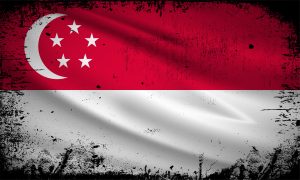Singapore’s government has outlawed the public display of foreign national emblems relating to the Israel-Hamas war without a permit, in its attempt to manage the domestic political fallout from the conflict.
In an advisory released yesterday, the Ministry of Home Affairs (MHA) stated that apparel and paraphernalia with emblems related to the Israel-Hamas conflict were being sold online and worn or displayed by members of the public. Given the current “heightened sensitivities,” it stated, anyone displaying or wearing such insignia will henceforth be jailed for up to six months and fined up to $500 under the Foreign National Emblems (Control of Display) Act 1949. According to the Straits Times, the law applies to all foreign national emblems, “including the flags and banners of any state.”
“The ongoing Israel-Hamas conflict is an emotive issue,” the MFA advisory stated. “The peace and harmony between different races and religions in Singapore should not be taken for granted, and we must not let events happening externally affect this peace and harmony we have in Singapore.” The MFA added that any travelers wearing such apparel could be denied entry into Singapore.
The MFA particularly states that “promoting or supporting terrorism through the display of apparel or paraphernalia that carries logos of terrorist or militant groups, such as Hamas or its military wing Al-Qassam Brigades, will not be condoned.” The MFA has seemingly extended this ban to pro-Israeli displays in order to maintain its neutrality and avoid any charge of bias.
The MFA said that any Singaporeans wanting to support those affected by the conflict could contribute “to authorized fundraising activities and donation drives in support of humanitarian relief efforts.”
The current war, which began with a series of violent Hamas raids on Israeli settlements adjacent to the Gaza Strip on October 7, has prompted waves of protests across the globe, many in opposition to the Israeli retaliations against the Gaza Strip. This includes in neighboring Indonesia and Malaysia, which have seen fervent pro-Palestine demonstrations.
Singapore’s response to the initial Hamas attacks was forthright compared to many Southeast Asian nations. The Ministry of Foreign Affairs immediately called out the Palestinian militant group by name and condemned its “rocket and terror attacks” on Israel, while Foreign Minister Vivian Balakrishnan yesterday announced in Parliament the seven principles that underpinned Singapore’s position on the crisis. These included a “zero tolerance approach” toward terrorism; the legitimate right to (in this case Israeli) self-defense; the necessity of proportionality in any response; and support for a two-state solution as the “only viable solution” to the Israel-Palestine conflict.
However, the city-state has balked at allowing the hotly contested politics of the Israel-Palestine conflict to play themselves out in a domestic political context. The People’s Action Party (PAP) government has denied five permits for protests related to the war since October 7. In justifying its denial of permission for one pro-Palestinian gathering, the Singapore Police Forces and the National Parks Board of Singapore stated that “the peace and harmony between different races and religions in Singapore should not be taken for granted, and we must not let events happening externally affect the internal situation within Singapore.”
Indeed, this sentiment was recapitulated nearly word for word as the sixth of the seven principles announced by Balakrishnan yesterday, which stated that “external events must not divide Singaporeans.”
“We must never allow conflicts elsewhere to divide us domestically,” Balakrishnan told Parliament. “Our ability to conduct consistent and coherent foreign policy in a very volatile and dangerous world depends on domestic cohesion and consensus.”
In a fashion typical of the PAP, the government’s actions betray a view of Singaporean society as inherently fragile – as a mass kindling liable to erupt at any moment into flaming political or sectarian conflict. Despite the city-state’s myriad achievements in the technocratic and economic realms, the party remains congenitally cautious and risk-averse to anything smacking of political contention.
This reflects the party’s experience of the early days of independence after 1965, when Singapore faced numerous very steep challenges, and when its success was far from assured. At the same time, this success has surely granted the city-state some room to cash in its dividend and expand, if only gradually, the political freedoms of its citizens.

































